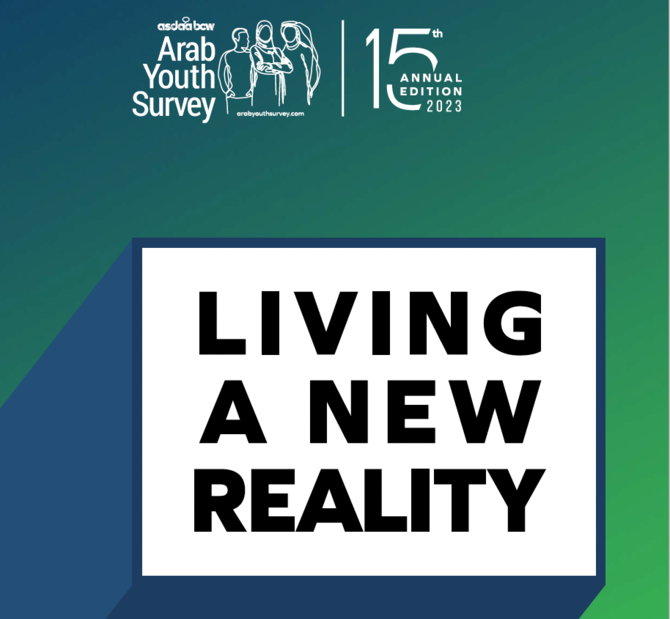
- ARAB NEWS
- 07 May 2024

DUBAI: Arab youth across the Middle East and North Africa (MENA) now say Saudi Arabia is one of the five countries in the world they would most like their own nation to be like, according to the 15th annual ASDA’A BCW Arab Youth Survey.
The ASDA’A BCW Arab Youth Survey, the largest study of its kind, surveyed youth — men and women aged 18 to 24 — across the Middle East, adding South Sudan this year, on their views, hopes and fears.
The youth surveyed this year are largely Gen Zs who did not experience key events in the region, such as the Arab Spring, and the rise and fall of Daesh, said Sunil John, founder and president of ASDA’A BCW.
This year’s report is titled “Living a New Reality,” because “in some ways, they (Gen Z) are living a new reality, which is very different from what the Arab world has experienced in the past,” John told Arab News.
The first part of the study, released this week, focuses on the theme “my global citizenship” and explores Arab youth’s views on geopolitics, regional conflicts and model nations.
This year, for the first time in the research since 2017, Saudi Arabia ranked among the top five countries in the world Arab youth want their own to emulate. When asked “Which country in the world, if any, would you most like your country to be like?” 11 percent said Saudi Arabia — the same percentage that named the UK.
The UAE ranked first (22 percent), followed by the US (19 percent), Canada (16 percent) and Qatar (15 percent).
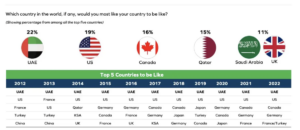
This also marks the first time since 2014 that three Gulf countries have appeared in the top five list, reflecting the influential power of events such as UAE’s Expo 2020 and the FIFA World Cup being hosted in Qatar, as well as Saudi’s Vision 2030.
Asked about Saudi Arabia’s economic and social reforms, the survey found nine in 10 supported policies to encourage more Saudi graduates and school-leavers to pursue careers in the private sector, while 91 percent said they supported a larger role for the private sector in the overall economy.
A massive 96 percent said they approved of the various tourism and leisure “giga-projects” taking shape in the Kingdom aimed at stimulating economic diversification and job creation.
Saudi youth also supported the Kingdom’s women-oriented initiatives, with 89 percent saying they endorsed policies encouraging women to play a more active role in society, such as rules allowing them to drive and participate in the performing arts, and 86 percent said they were in favor of women joining the workforce.
Arab youth also had strong opinions about international and regional politics. The study found that nearly two-thirds of Arab youth believe tensions between Iran, Israel and the West will lead to military conflict, with the number rising to 72 percent in the Levant.
Only 33 percent of Arab youth believe that tensions will be resolved through diplomatic means, which is “quite surprising,” especially when you consider that “nuclear powers getting into war can be extremely dangerous,” said John.
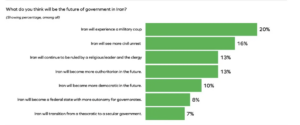
Moreover, over a third said Iran is heading toward civil unrest (16 percent) and possibly a military coup (20 percent). Only seven percent believe that Iran will transition from a theocratic to a secular government.
Arab youth seem largely pessimistic about the Palestinian-Israeli conflict being resolved in the next five years. GCC youth seem more hopeful, with 60 percent believing the resolution is likely within that time frame, while 69 percent in the Levant and 57 percent in North Africa believe it is unlikely.
The survey also found that most Arab youth oppose the normalization of ties with Israel, except the nationals of the UAE, with 75 percent supporting their government’s decision, followed by Egypt at 73 percent, Morocco at 50 percent and South Sudan at 47 percent.
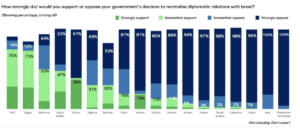
However, more than 80 percent of the youth in Syria, Yemen, Tunisia and Kuwait oppose the normalization of ties with Israel, with this number growing even higher in Saudi Arabia (98 percent), Lebanon (98 percent), Libya (99 percent) and Iraq (100 percent).
Still, John said that there has been “quite a dramatic improvement” from just a few years ago.
Another key finding in this year’s survey is Turkiye and China replacing the US and the UK as allies of countries in the Arab world.
The top non-Arab allies this year are Turkiye (82 percent), China (80 percent), UK (79 percent), Germany (78 percent), and France (74 percent).
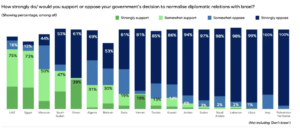
The US dropped to seventh place after India as an ally.
Still, 66 percent said the US would be a stronger ally than Russia and 62 percent said it would be a stronger ally than China over the next five years.
“There’s no wishing away the influence of the US,” said John, with 33 percent of Arab youth believing the US wields the most influence over the Arab world, followed by the UAE (11 percent), Saudi Arabia (10 percent), Israel (10 percent), Russia (8 percent) and Iran (5 percent).
However, this does not necessarily mean that Arab youth desire the influence to continue.
“The US, while (still) actively engaged, has been disengaging from the region for some time now,” John added.
The survey asked respondents how they felt about the US disengaging from the region, and the majority (61 percent) of Arab youth said they support it.
Among the Arab nations, Qatar came out on top as an ally, with 92 percent saying it was a “strong ally or somewhat of an ally” of their country, followed by Kuwait (91 percent), Egypt (89 percent) and the UAE (88 percent).
“The rise of Qatar to number one position is a stunning rise, and we call it the ‘World Cup effect’,” said John.
However, overall, Saudi Arabia ranked as the strongest ally, with 54 percent saying it is a “strong ally” and a total of 86 percent considering it a “strong ally” or “somewhat of an ally.”
“Clearly, a mood of optimism is taking hold among Saudi youth, which our latest Arab Youth Survey reflects,” said John.
He added: “Perceptions of Saudi Arabia outside the Kingdom have also improved, which is another significant trend. Our latest survey suggests that the changes underway in the Kingdom are seen by the region’s youth as a successful model for their nations to follow.”